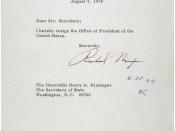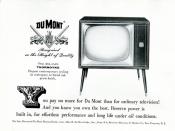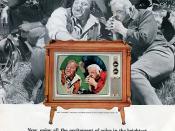Is our government today really about the people, when the media and how much the government wants us to know regulate so much of what we know? In today's society the media is a big factor in how we look at candidates and their viewpoints. We saw this in the recent 2000 presidential election that making a good impact on the media will make or break an election. The media today shapes and molds our ideas and beliefs about the government.
From the time when television was invented the journalism industry has gone astray in their position as the authority of political information. In the beginning of televised politics the press set out to have an excellent connection with the government, but it didn't really turn out that way (Gergen 1). Television has exerted a deep pressure on American politics and how we see America's government progress from the time when it started entering homes in the late 1940's.
At this time there was less than 400,000 TV's in America. The media came about being a key player in the 1948 election with the introduction of new stations like NBC, ABC and CBS. With all these stations combined it offered a look at party conventions and candidates. This same year the public saw the first political TV ad made for Harry Truman to encourage the public to acknowledge the Dewy conquest as unsurprising, but to get out and vote anyways. Dewy discarded the concept of TV ads cause he thought they were degrading. By 1952 Americans were able to have a look at the convention halls to see Eisenhower and Stevenson put on the ballots. This election was also the first where Eisenhower hired a well-known ad agency to produce commercials for him. In 1960 the media world took the elections for another turn with the first televised political dispute among the candidates. The election of 1964 was when American viewers saw how tense politics can become. The hint of attacking the others candidate's personality and thoughts come into play (Rothwell 2-5). Throughout the Vietnam War and the Watergate disgrace in 1969, there was a damaging feeling in the pressrooms, and there was also too much of the "we versus they" and the "press-as-the-enemy" attitudes where taking over mood in the government.
Compounding with the incline of television popularity, public outlook surveys were making a public executives and politicians not as apt to make use of the authority the people trust in them They recognize that their trade, nomination, was not about making friends but to avoid making foes. If the census demonstrated they were going to get in a jam by being decisive, they would fine-tune their plans (Reeves 5).
Reporters who cover politics are somewhat like politicians. They want to increase their grasp of integrity and social standing. The reporters don't have much do deal with though of a political matter and are further influenced by peers and making certain details are accurate (Reeves 40-41). Confident with their expert trade, journalists have not clearly stated the position of a self-governing arbitrator who are thankful to society for watching and account on the correctness and fairness of campaigns. The only consequence of this development has been increasing adversarial or lack of interest in reporting of political campaigns( Inyengar 145). Journalists generally meet disapproval in media campaigns. They do not succeed in informing the people about the material. The most significant material not stated is the candidates' stance on topics ( Iyengar). The media is starting to endure some of the similar sorts of disapproval and thrashing of self-assurance that many organizations have had to deal with in the last 15 to 20 years. The American society is apt to disbelieving big and influential associations that are looked upon as attempting to assist their individual needs. The media has turned out to be a huge organization inside our culture but too, a lot of those who now work as reporters are looked upon as serving, not the community, but their individual desires, attempting to earn wealth and a good status. The other problem that we find with the media today is overconfidence that you will find in some of their attitudes. There is also the way that they can influence people's personal lives( Gergan 10 ).
The only dependable basis of variety and wealth in American mass media content is variety of possession of the media and public approach that recognizes the validness of that resource( Bagdikian 67 ). Dishonesty has arrived at a widespread quantity in our society and in our organizations in recent years. It has become so bad that all are use to it. If we can't have trust in our president, whom can we trust? Who should we go along with, or even more appalling, why should we pursue? The problem with confronting dishonesty like this is that the harm is done respect for reality. If the honesty is not respected, there is no sense of right or wrong, there is no range, without range, a man and nation get vulnerable( Bradlee 127). There have been many scandals within politics and the media has been a big influence on it, from the Watergate scandal to the past controversial 2000 presidential election. Think of how the past could have been altered if these unexplainable events had been left untold and if it was kept confidential. We, as the American civilization will by no means be aware of exactly what has taken place, simply what the government and the media have chosen to inform us with (Bradlee 131).
Political crusades in 1896 were believed to empower society by giving them confidence to take part in an election and were deemed as a priceless component of self-governing politics. The campaigns of the recent century are not actually intended to do this. The electoral improvement and mechanical advances have influenced an innovative structure of campaigning in which the mass media has put back the political party as the main liaison amid the people and the nominee( Iyengar 143-144). The position of the common civilian in political affairs also weakened to an outsider of kind. Between 1968-1988 the proportion of Americans who give an account of having completed labor for a party contender cut down by half. At this time in the television age, campaigns usually consist of a sequence of pre-arranged proceedings, gatherings and disputes being for the most part prominent. At this occasion the nominees portray themselves to the media and the community in a set-up that from time to time like mass amusement display. The deed of watching TV advertisements has substituted the deed of being at a political gathering, which has in fact dampened societies curiosity in the government. Less Americans are paying attention to elections the numbers in presidential and off-year elections has dropped greatly since 1960 ( Iyengar 144). Societies desire for political affairs has been additionally dampened by the strategy used by the nominees and the media. The quality of campaign discussion has twisted more and more aggressive and unsightly. More frequently than not nominees use their press coverage chances to pass judgment on, doubt, or scorn their adversary more willingly than to endorse their individual thoughts (Inyengar 145).
This is because the press mainly forms societies main concerns; the lack of awareness to women's concerns in the news does little to shove these concerns to the peak of the schedule. Women's concerns have usually established very little consideration in the press. As women went on to attain political power, their matters began to build their way to the face of the documents ( Kahn, Goldberg 161 ). The attendance of female journalists is most likely an optimistic assessment of female nominees. A significant source for women running for a government organization would be the attendance of a woman journalist on the workforce of a key newspaper. Sadly, women political journalists are still moderately uncommon. Only 24 percent of all the campaign editorials printed is by women. The press acts as a blockade for women determined for an electoral position. Some of the dissimilarity as to what men and women are treated in a different way by the media may be supported by a journalists and editors outlook or typecast about men and women nominees. Women nominees may be given a smaller amount of reporting because the press deems women less important challengers and consequently less interesting (Kahn, Goldberg 162).
The office of president has lost one of the most important powers that it was given, to regulate the amount of information that society should know about politics. Now a day what society is told all depends on how much the press chooses to tell (Reeves 5). With complicated speech the white house has a representative to be in touch with the media. With grammar that you can hardly understand and bizarre neologisms, this incarcerates the difficulty of news organization. The overall result is to make sure that the white house is in charge of the material and the surge of news down to the most recent fact. The management assumes a civilization of virtually total reliance for the white house journalists. From the time a journalist leaves the white house pending their return with ornaments and keepsakes in hand, journalists are waited on and taken care of by the management. With a generous charge drawn in the white house will take them anywhere around the world and will keep them up-to-date with plenty of information. There is no other nation that even compares with all the services provided to journalists by public officials. Soon after arriving at any information, each statement is documented and right away recorded for the advantage of the journalists.
For a long time in American history politics was just something that adults paid attention to and worried about. But with television, technology such as the Internet, and print media, young adults are starting to become more interested in politics today. Young adults today are learning that they too can make a difference in how out country and government is run. Societies young people today don't just want to sit around and complain about the future of our nation. They want to get up and do something about it. Weather the media does fabricate politics or not, our generation is learning to use the media and new technological advances to their advantage. Our ideas and our influenced by how much the government and the media decide the American society should know. As we have seen from recent 2000 presidential, the politics is a very complicated system that a lot of people will never understand fully how it operates, and that are scandals that we as a society will never know. But one thing will always remain the same; the media will always be there to cover all side of politics. They now have programs starting as early as elementary school with mock elections to get kids excited and involved in politics.
With the new millennium's election this year, everyone old enough to vote was excited. The media made it out to be a great event' they wanted to make sure everybody went out and voted. The Music Television station or M-TV made and an attempt to get the younger voting society to get up and be heard by having a concert tour and campaign travel throughout America. It also gave the candidates a chance to relax and have a good time but still get his ideas across, and this made the people really see how they acted in an odd situation. The tour campaign was called "Rock the Vote," and it was successful the first time they had it. There was a big response in the polls from the younger generation. This election proved to be just as exciting as any before with the too close to call ballots and the weeks of anticipation. This also didn't disappoint us with all the scandals and lies that went around in the last few weeks that will someday all come unrevealed. Our ideas and beliefs are influenced by how much the government and the media decide the American society should know. As we have seen from the recent 2000 presidential that politics is a very complicated system that most people will never understand fully how it operates, and that there is scandals that we as a society will never know about. But one thing will always remain the same; the media will always be there to cover all sides of politics. And we will watch with a curious and critical mind on how or new president now tries to make life better for America for the next four years.





